According to the U.S. State Dept.’s Bureau of Educational and Cultural Affairs website, there are 562 students working on J-1 visas on the Outer Cape this summer (351 in Provincetown, 99 in Wellfleet, 69 in Eastham, and 43 in Truro). The State Dept. says Summer Work Travel visas “provide foreign students with an opportunity … to experience and be exposed to people and way of life in the United States.” —Paul Benson
‘Coming here, you appreciate your country more’
Kristina Valerieva Tsoneva
Kristina works in Provincetown as a hostess at the Nor’East Beer Garden and as a sandwich maker at Pop + Dutch. She is from the small Bulgarian city of Silven and is studying to become a teacher at the University of St. Cyril and St. Methodius in Skopje.
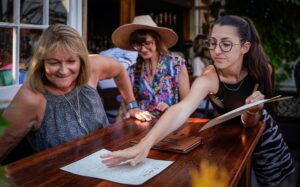
(Photo by Elias Duncan)
This is Kristina’s third summer coming to America to work. She arrived that first summer in Ocean City, N.J. feeling like she “needed to do something different” with her life. She worked at Acme Market as a deli clerk but found the experience challenging. Her work hours were long, and she didn’t find opportunities to meet new people.
The next summer, Kristina was excited to join a group of friends headed for Provincetown. But the number of rooms she was assigned to clean at the hotel where she was initially employed overwhelmed her. “They know that we Bulgarians are really hard-working people,” she says. She reset her expectations about the exchange: “You’ll always be a foreign person, and they don’t care about you that much,” she says.
Once she quit that job and began a new one at the beer garden, she began to enjoy Provincetown. She says she loves it here and felt so supported by the management and fellow staff that she decided to come back again this summer.
She also fell in love with the openness of Provincetown. “Here you can be yourself,” Kristina says. “That’s why I love it here. I’ll be walking down the street and a girl will be like, ‘Oh, you have such beautiful hair.’ I love that.”
Though the J-1 program is marketed by the State Dept. as an “educational and cultural exchange,” Kristina says many Bulgarians come for the money they can make in a summer. She earned the equivalent of her mother’s annual salary in just four months here, she says.
To learn more about America, Kristina followed her three months of work here last summer with travel. She booked a hotel in New York and one in Miami, and she says the experience made her realize “you can have a lot of fun in America.”
Now Kristina tells her Bulgarian friends about the J-1 experience. “I tell people, ‘Go to America. You’ll love it. Just try new things,’ ” she says. “It’s very different from Bulgaria, and we need that. By coming here, you appreciate your country and your people more.” —Oliver Egger
Best friends, back for a second summer
Maria Ilie and Adrian Adam
Psychology students Marie Ilie and Adrian Adam, from Iași, Romania, are in their second summer of working in Provincetown. The two met in high school but didn’t immediately hit it off. “She didn’t like me,” says Adam, recalling how Ilie reacted unenthusiastically when he invited her to his 15th birthday party. But she said yes, a friendship blossomed, and they are now “best buddies,” says Ilie.
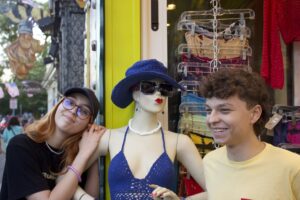
The two both work at Shop Therapy and Puzzle Me This on Commercial Street, alternating shifts. Ilie covers the day shift at the puzzle store and the night shift at Shop Therapy, while Adam does the opposite. They synchronize their breaks daily, meeting up at 1:30 p.m. for lunch and 7:30 p.m. for dinner.
“The job opportunities are better here than in Romania,” says Ilie. She enjoys serving the nighttime clientele in the upstairs, age-restricted section of Shop Therapy. Having gained expertise on the multicolored toys catering to wide-ranging appetites, she says with confidence, “I’m good at my job.”
Despite Provincetown’s picturesque seaside setting, Ilie admits she’s not a fan of water, saying, “I only like showers and baths.” Adam says he enjoys swimming but hasn’t yet had time to take a plunge into Cape Cod’s waters.
With just one day off each week, exploring Provincetown poses a challenge. On their free days they wake as late as possible, do laundry, visit the grocery store, and minimize time on their feet — standing for 14 hours a day takes a toll, they say.
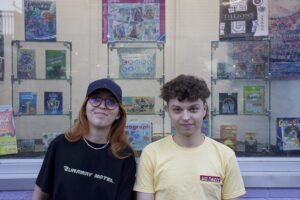
For Ilie, the biggest culture shock America offers is the food: “fried and salty.” Adam shares the sentiment. Ilie is also taken aback by Americans’ use of credit cards: “Why do they spend so much money that they don’t even have?” she asks.
Adam says the biggest surprise for him has been the demographics of Provincetown’s workplaces. “I don’t really see Americans working these jobs,” he says. “It’s mostly students from Europe or Jamaicans.”
Ilie and Adam have acquired favorite items at their jobs. Adam uses his puzzle store staff discount for the Pusheen toys, while Ilie goes for the Rubik’s Cubes — she can speed cube. —Georgia Hall
Cultural immersion with 13 other Bulgarians
Katrin Chocheva
Working as a cashier at Savory and the Sweet Escape is a first-time thing for Katrin Chocheva, who goes by Kate, at least at work in Truro. Chocheva, here on a J-1 visa, is a second-year macroeconomics student in Bulgaria. She says she’s wanted to come the U.S. since she was young and was happy to finally have the opportunity this year, especially because her boyfriend, who also works at Savory, was able to come with her.
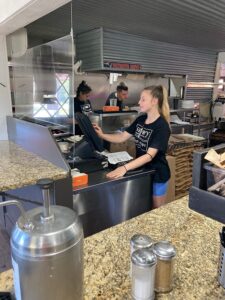
So far, Chocheva says, the exchange has more than lived up to her expectations. She said she has loved going to art galleries in Provincetown and has particularly enjoyed the range of people she has come across. “There are different people, different cultures here,” she says. “You can meet everybody.”
Chocheva’s American experience includes a trip to Boston, where she liked seeing a skyline of tall buildings and trying an American scone for the first time, which she said was “yummy.”
But amidst the cultural immersion, she has plenty of compatriots alongside her. Thirteen Bulgarians work at Savory, and they all live together in the back of the store, four people to a room, she says, which, she adds, is “a blast.”
In the future, she says, she’s going to pursue a master’s degree and become a secretary. But next summer, she says, she’ll be back on the Cape, working the register at Savory. —Nicholas Miller
Saving for an apartment back home
Mario Galubov already has a career as a stage actor and bartender — he graduated from the National Academy of Theatre and Film Arts in Sofia, Bulgaria in 2019 — but he went back to school for a second degree in sociology last year. He came to America for the first time this May as a J-1 student.
“I had just come off a run of five shows,” Galubov says, including a role as Mercutio in Romeo and Juliet, when he decided he was in a rut and wanted to broaden his experience. He traveled to Thailand and Malaysia that summer, began his sociology classes in the fall, and started making plans to come to the U.S. through the State Dept.’s summer work travel program last November.
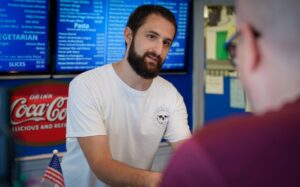
“It costs about $3,000 to get here,” Galubov said, money that goes to sponsor agencies, U.S. embassy fees, and plane tickets, among other costs. Galubov arranged his own jobs at Ross’ Grill, where he tends bar four afternoons and two evenings, and at Provincetown House of Pizza, where he works another five shifts. His housing is above the House of Pizza, where five people share a three-bedroom apartment.
“It’s great, actually — we have a good TV and free Netflix and Wi-Fi,” Galubov says. “I have heard of places where it’s four people per bedroom, two people sharing each bed, and ours is not like that.”
Provincetown is marketed as a “premium destination” for J-1 students, Galubov says — there is more money to be made here than in Orlando or Ocean City. His acting job pays $600 a month, which he can sometimes earn here in two days. He is saving to buy an apartment back home.
Nonetheless, there is some risk involved in coming here, Galubov says. “My roommate was fired, and he had six days to move out and find a new job with housing. He found one, and he found housing — but imagine how much he paid to be here, and he could have been sent home with nothing.” —Paul Benson
